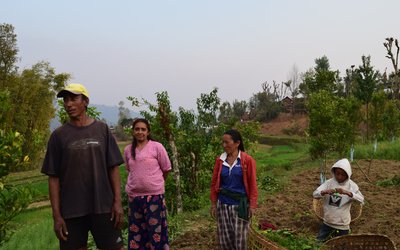Domestic Violence Act defines "Domestic Violence" as any form of physical, mental, sexual and economic harm perpetrated by person to a person with whom he/she has a family relationship and this word also includes any acts of reprimand or emotional harm. The Act further defines "Domestic relationship" as a relationship between two or more persons who are living together in a shared household and are related by descent (consanguinity), marriage, and adoption or are family.
Domestic violence is a manifestation of the historically unequal power dynamic between men and women, which has led to the domination and discrimination against women by men to prevent women from fully advancing in society. It is based in cultural, social and religious patterns, which enforce and justify the lower status of women in the family and society at large. It is one of the forms of gender based violence.
In the context of Nepal, dowry demands and dowry related crimes, i.e. abuse and even murder, are increasing day by day in our society, especially in the terai region. Our social norms have taught women to bear every humiliation, beating, molestation, even burnings. Women do not speak out because of their fear of losing honour. Thus, because of the culture of silence, women become more vulnerable to violence. Wife beating and battering is the most common form of abuse. A husband slapping or delivering a blow to his wife is regarded as routine husband-like behaviour. A preference for a son leads to female foeticide, which is another example of where women are victimized.
If we look closely at the present Act on Domestic Violence, we can find several lacunas and challenges. As such, there is a provision for lodging a written or oral complaint, setting out the details thereof with the Police Office, National Women Commission, Local Body, and the Court. However there are problems with the reporting and filing of the cases since there are several instances where oral complaints were not registered or filed. Even with written complaint there is a lack of coordination amongst the complaint receiving bodies and in the procedures followed by them.
The Act remains symbolic due to the absence of effective measures regarding prosecution when complaints are filed directly to the court by the complainant, the lack of powers or the police to detain the perpetrator until the issuance of an interim order, and the lack of prescribed measures for coordinating the actions of various agencies to support the victim. Also lodging cases to the Women Commission is a difficult task as there is only one women commission at the central level. It would be almost impossible for rural women to approach before it. Also the regulation of the Women Commission is contradictory to the regulation of the Domestic Violence Act.
While the Act talks about the establishment of the Service Centre and Service Fund for the purpose of immediate protection of the victim, it has not yet been established. Also there is no separate court to look after cases involving domestic violence. The law contains no additional provision that facilitates the filing of a complaint directly with the court, nor procedures to be followed in collecting evidence and prosecuting the perpetrator. In the absence of the necessary legal provision, rule or guideline, women shall continue to be unable to directly access the court thereby defeating the very purpose of providing protection from domestic violence.
The provisions that prevents the detention of the perpetrator either in police or judicial custody until such time that a settlement is reached or an interim order is issued by the court has threatened the very basis of access to justice for women because they may be rendered further vulnerable to violence upon having lodged a complaint.
Serious forms of domestic violence needs to be recognized as a crime against state, and police should have the power to detain them for investigation in domestic violence cases. There is a need to establish the Family Courts in order to enable women to report cases of domestic violence, to address these types of cases with better understanding and to quickly settle family dispute. There should be a provision for voluntary and compulsory counseling for the victims of domestic violence to address their problem and also facilitates in reintegrating family members. Domestic violence cases needs to be put under the Annex-I of the State Cases Act, 1992, and should defend by the Government Attorney.
CEDAW provides a working forum for the process of eradicating gender-based violence and promoting gender equity in the international community and at every level of national life. Further more, General Recommendation No. 19 of CEDAW Committee places an obligation on State Parties to take all legal and other measures that are necessary “to provide effective protection to women against gender based violence, including an effective legal measures, preventive measures and the protective measures including rehabilitation and support services for women victim of violence.”
To review, a State should take every legal measure necessary to protect women from all forms of abuse, including domestic violence, which inhibits women’s ability to enjoy their rights and freedoms on an equal basis with men. The society needs is to internalize domestic violence as gross human rights violation against women, which requires action from every sphere of the society, including the Legislature, Judiciary, Executive, civil society organizations, and the people generally.
- TANAHU HYDROPOWER PROEJCT: A Significant Achievement
- Apr 15, 2024
- AMBASSADOR HANAN GODAR: Sharing Pain With A Nepali Family
- Mar 30, 2024
- VISIT OF KfW AND EIB TO NEPAL : Mission Matters
- Mar 25, 2024
- NEPAL BRITAIN SOCIETY: Pratima Pande's Leadership
- Mar 24, 2024
- NEPAL ARMY DAY: Time To Recall Glory
- Mar 15, 2024
















